Related Research Articles

Thimphu is the capital and largest city of Bhutan. It is situated in the western central part of Bhutan, and the surrounding valley is one of Bhutan's dzongkhags, the Thimphu District. The ancient capital city of Punakha was replaced as capital by Thimphu in 1955, and in 1961 Thimphu was declared as the capital of the Kingdom of Bhutan by the 3rd Druk Gyalpo Jigme Dorji Wangchuck.
Transport in Bhutan uses about 8,000 kilometres (5,000 mi) of roads and four airports, three of which are operational and interconnected. Paro Airport is the only airport which accommodates international flights. As part of Bhutan's infrastructure modernization programs, its road system has been under development since the 1960s. There are no railways and, since Bhutan is a landlocked country without major waterways, there are no ports.
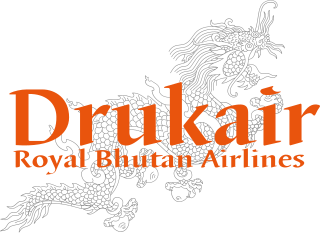
Drukair Corporation Limited, operating as Drukair — Royal Bhutan Airlines, is the flag carrier of the Kingdom of Bhutan, headquartered in the western dzongkhag of Paro.
DashoLhendup Dorji was a member of the Dorji family of Bhutan. He was also the brother of the Queen of Bhutan, Ashi Kesang choden and uncle to the fourth king of Bhutan, King Jigme Singye Wangchuck. He served as acting Lyonchen following the assassination of his brother, Lyonchen Jigme Palden Dorji, on April 5, 1964.
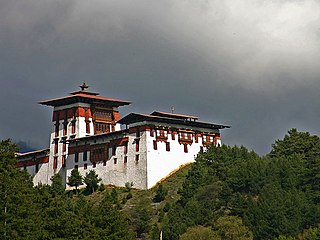
Jakar is a town in the central-eastern region of Bhutan. It is the district capital of Bumthang District and the location of Jakar Dzong, the regional dzong fortress. The name Jakar roughly translates as "white bird" in reference to its foundation myth, according to which a roosting white bird signalled the proper and auspicious location to found a monastery around 1549.
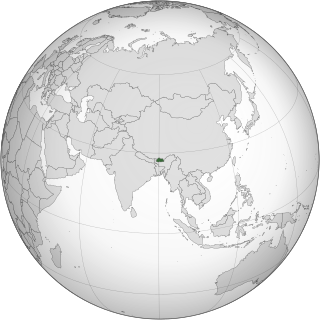
Lesbian, gay, bisexual and transgender (LGBT) people in Bhutan face legal challenges not faced by non-LGBT people. Same-sex sexual activity was decriminalised in Bhutan on 17 February 2021.
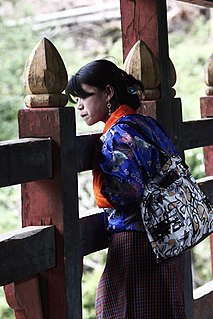
Economic development in the country of Bhutan has increased opportunities for women to participate in fields such as medicine, teaching, and administration. Women were providing more labor than men in all sectors of the economy. Less than 4 percent of the total female work force was unemployed, compared with nearly 10 percent of men who had no occupation. In particular, nearly 10 percent of government employees were women by 1989. During their government careers, women civil servants were allowed three months of maternity leave with full pay for three deliveries and leave without pay for any additional deliveries.
Health in Bhutan is one of the government's highest priorities in its scheme of development and modernization. Health and related issues are overseen by the Ministry of Health, itself represented on the executive Lhengye Zhungtshog (cabinet) by the Minister of Health. As a component of Gross National Happiness, affordable and accessible health care is central to the public policy of Bhutan.

Queen Mother Sangay Choden is one of the four wives and queens of Bhutanese king Jigme Singye Wangchuck, who ruled in Bhutan from 1972 until his abdication in 2006. She is the Queen Mother of Bhutan.
The Tobacco Control Act of Bhutan was enacted by the Parliament of Bhutan on 6 June 2010 and came into force on 16 June. It regulates tobacco and tobacco products, banning the cultivation, harvesting, production, and sale of tobacco and tobacco products in Bhutan. The act also mandates that the government of Bhutan provide counselling and treatment to facilitate tobacco cessation. Premised on the physical health and well being of the Bhutanese people – important elements of Gross National Happiness – the Tobacco Control Act recognizes the harmful effects of tobacco consumption and exposure to tobacco smoke on both spiritual and social health.
Taxation in Bhutan is conducted by the national government and by its subsidiary local governments. All taxation is ultimately overseen by the Bhutan Ministry of Finance, Department of Revenue and Customs, which is part of the executive Lhengye Zhungtshog (cabinet). The modern legal basis for taxation in Bhutan derives from legislation. Several acts provide for taxation and enforcement only germane to their subject matter and at various levels of government, while a smaller number provide more comprehensive substantive tax law. As a result, the tax scheme of Bhutan is highly decentralized.
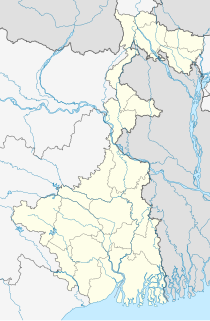
Bhutan House is an estate located in Kalimpong, West Bengal, India, owned by the Dorji family of Bhutan. The site is the traditional administrative Dzong for southern Bhutan, and also functioned as the administrative center for the whole of western Bhutan during the modern kingdom's early years of consolidation. It represented the relationship between Bhutan and British India, and is a modern symbol of Bhutan–India relations.

Desi Jigme Namgyal of Bhutan is a forefather of the Wangchuck Dynasty. He served as 48th Druk Desi of Bhutan (1870–1873), and held the hereditary post of 10th Penlop of Trongsa. He was called the Black Ruler.
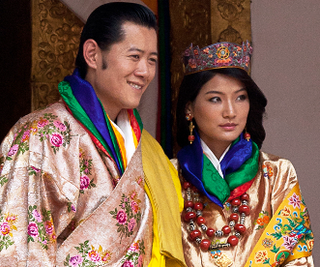
The wedding of Jigme Khesar Namgyel Wangchuck, King of Bhutan, and Jetsun Pema took place on 13 October 2011 at the Punakha Dzong in Punakha, Bhutan. The current King of Bhutan, Jigme Khesar Namgyel Wangchuck, married Jetsun Pema, who became Queen Ashi Jetsun Pema Wangchuck. Both are descendants of the 48th Druk Desi of Bhutan and 10th Penlop of Trongsa, Jigme Namgyal.

The lakes of Bhutan comprise its glacial lakes and its natural mountain lakes. Bhutanese territory contains some 2,674 high altitude glacial lakes and subsidiary lakes, out of which 25 pose a risk of GLOFs. There are also more than 59 natural non-glacial lakes in Bhutan, covering about 4,250 hectares (16.4 sq mi). Most are located above an altitude of 3,500 metres (11,500 ft), and most have no permanent human settlements nearby, though many are used for grazing yaks and may have scattered temporary settlements.

There are a number of environmental issues in Bhutan. Among Bhutan's most pressing issues are traditional firewood collection, crop and flock protection, and waste disposal, as well as modern concerns such as industrial pollution, wildlife conservation, and climate change that threaten Bhutan's population and biodiversity. Land and water use have also become matters of environmental concern in both rural and urban settings. In addition to these general issues, others such as landfill availability and air and noise pollution are particularly prevalent in relatively urbanized and industrialized areas of Bhutan. In many cases, the least financially and politically empowered find themselves the most affected by environmental issues.
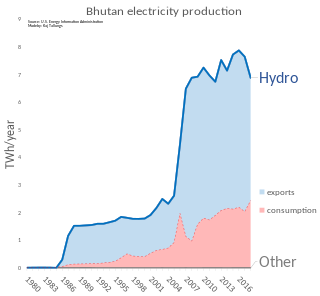
Energy in Bhutan has been a primary focus of development in the kingdom under its Five-Year Plans. In cooperation with India, Bhutan has undertaken several hydroelectric projects whose output is traded between the countries. Though Bhutan's many hydroelectric plants provide energy far in excess of its needs in the summer, dry winters and increased fuel demand makes the kingdom a marginal net importer of energy from India.

Motithang Higher Secondary School is a government high school in the capital city of Thimphu, Bhutan. It was established in the year 1975. Motithang translates to The Meadow of Pearls in English.

Ashi Kesang Choden is the Queen Grandmother of Bhutan. She participates in royal duties of her own accord. She is the only queen grandmother in the world. In Bhutan she is called The Royal Grandmother.

The COVID-19 pandemic in Bhutan is part of the worldwide pandemic of coronavirus disease 2019 caused by severe acute respiratory syndrome coronavirus 2.
References
- 1 2 3 4 5 6 HIV/AIDS in the South-East Asia Region: progress report 2010 (PDF) (Report). World Health Organization, Regional Office for South-East Asia. 2010. pp. 43–45. ISBN 978-92-9022-389-4. Archived from the original (PDF) on 2011-07-06. Retrieved 2011-11-21.
- ↑ "The Ministry of Health has Detected…". Bhutan Observer online. 2011-08-01. Archived from the original on 2011-10-28. Retrieved 2011-11-21.
- 1 2 3 4 5 6 7 8 "An Update on Human Immuno Deficiency Virus/Acquired Immuno Deficiency Syndrome (HIV/AIDS)" (PDF). Bhutan Ministry of Health. 2010-07-01. Archived from the original (PDF) on 2012-05-08. Retrieved 2011-11-22.
- 1 2 Annual Health Bulletin 2010 (PDF) (Report). Ministry of Health (Government of Bhutan). 2010. ISBN 978-99936-767-2-0. Archived from the original (PDF) on 2011-07-06. Retrieved 2011-03-10.
- ↑ Pokhrel, Nirmala (2011-02-26). "Thimphu Survey Shows High Risk Sexual Conduct". Kuensel online. Retrieved 2011-11-21.[ permanent dead link ]
- ↑ Wangchuk, Sonam (2011-08-19). "Sex, Disease, and Criminality". Bhutan Observer online. Archived from the original on 2011-11-19. Retrieved 2011-11-21.
- 1 2 "Lhaksam ལྷག་བསམ། Bhutan Network of Positive People" . Retrieved 2011-11-21.
- ↑ Pelden, Sonam (2011-02-21). "A – The covert status of this support group NGO reflects the society it exists in". Kuensel online. Retrieved 2011-11-21.[ permanent dead link ]
- 1 2 Pelden, Sonam (2011-11-21). "To Come out of the Closet or Not?". Kuensel online. Retrieved 2011-11-21.[ permanent dead link ]
- ↑ Pelden, Sonam (2011-10-15). "No Law in Place to Protect Their Rights". Archived from the original on 2011-10-22. Retrieved 2011-11-21.
- 1 2 "History: National STI and HIV/AIDS" (PDF). Bhutan Ministry of Health. p. 2. Archived from the original (PDF) on 2012-05-08. Retrieved 2011-11-21.
- ↑ "Editorial: Living with HIV/AIDS". Kuensel online. 2011-02-23. Retrieved 2011-11-21.[ permanent dead link ]
- ↑ Pelgen, Ugyen (2011-10-01). "IMS Builds Capacity for Lhaksam (HIV – NGO)". Bhutan Times online. Archived from the original on 2012-04-20. Retrieved 2011-11-21.
- ↑
 This article incorporates text from this source, which is in the public domain .Robert L. Worden (September 1991). Andrea Matles Savada (ed.). Bhutan: A country study. Federal Research Division. Health.
This article incorporates text from this source, which is in the public domain .Robert L. Worden (September 1991). Andrea Matles Savada (ed.). Bhutan: A country study. Federal Research Division. Health.